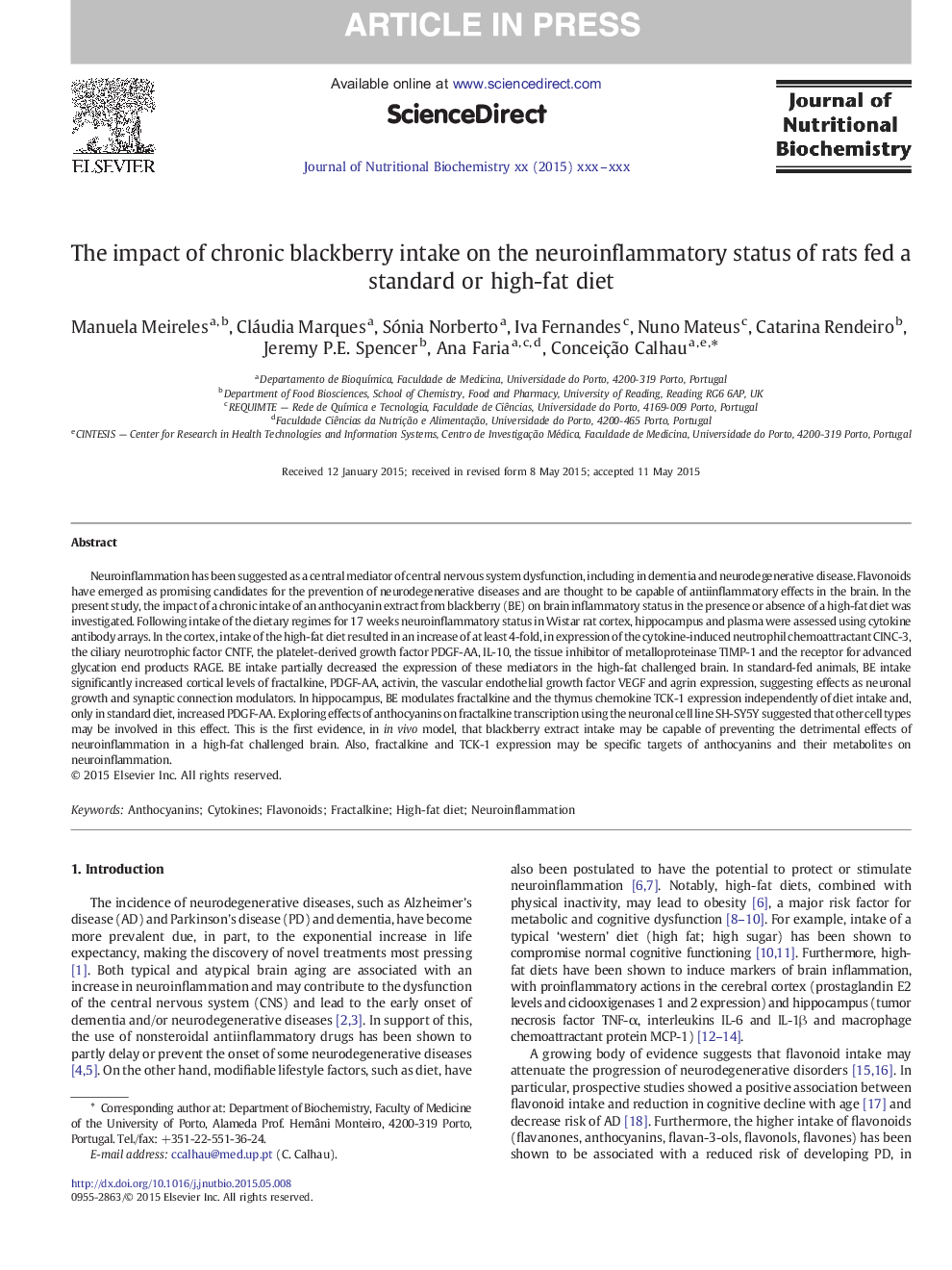| کد مقاله | کد نشریه | سال انتشار | مقاله انگلیسی | نسخه تمام متن |
|---|---|---|---|---|
| 8336782 | 1540643 | 2015 | 8 صفحه PDF | دانلود رایگان |
عنوان انگلیسی مقاله ISI
The impact of chronic blackberry intake on the neuroinflammatory status of rats fed a standard or high-fat diet
ترجمه فارسی عنوان
تأثیر مصرف سیاه قلمروی مزمن بر وضعیت عصبی و التهابی موش های صحرایی که دارای یک رژیم استاندارد یا چربی بالا هستند
دانلود مقاله + سفارش ترجمه
دانلود مقاله ISI انگلیسی
رایگان برای ایرانیان
کلمات کلیدی
آنتوسیانین ها، سیتوکین ها، فلاونوئیدها، فراکتالکین، رژیم غذایی با چربی بالا، عصب خونی
موضوعات مرتبط
علوم زیستی و بیوفناوری
بیوشیمی، ژنتیک و زیست شناسی مولکولی
زیست شیمی
چکیده انگلیسی
Neuroinflammation has been suggested as a central mediator of central nervous system dysfunction, including in dementia and neurodegenerative disease. Flavonoids have emerged as promising candidates for the prevention of neurodegenerative diseases and are thought to be capable of antiinflammatory effects in the brain. In the present study, the impact of a chronic intake of an anthocyanin extract from blackberry (BE) on brain inflammatory status in the presence or absence of a high-fat diet was investigated. Following intake of the dietary regimes for 17Â weeks neuroinflammatory status in Wistar rat cortex, hippocampus and plasma were assessed using cytokine antibody arrays. In the cortex, intake of the high-fat diet resulted in an increase of at least 4-fold, in expression of the cytokine-induced neutrophil chemoattractant CINC-3, the ciliary neurotrophic factor CNTF, the platelet-derived growth factor PDGF-AA, IL-10, the tissue inhibitor of metalloproteinase TIMP-1 and the receptor for advanced glycation end products RAGE. BE intake partially decreased the expression of these mediators in the high-fat challenged brain. In standard-fed animals, BE intake significantly increased cortical levels of fractalkine, PDGF-AA, activin, the vascular endothelial growth factor VEGF and agrin expression, suggesting effects as neuronal growth and synaptic connection modulators. In hippocampus, BE modulates fractalkine and the thymus chemokine TCK-1 expression independently of diet intake and, only in standard diet, increased PDGF-AA. Exploring effects of anthocyanins on fractalkine transcription using the neuronal cell line SH-SY5Y suggested that other cell types may be involved in this effect. This is the first evidence, in in vivo model, that blackberry extract intake may be capable of preventing the detrimental effects of neuroinflammation in a high-fat challenged brain. Also, fractalkine and TCK-1 expression may be specific targets of anthocyanins and their metabolites on neuroinflammation.
ناشر
Database: Elsevier - ScienceDirect (ساینس دایرکت)
Journal: The Journal of Nutritional Biochemistry - Volume 26, Issue 11, November 2015, Pages 1166-1173
Journal: The Journal of Nutritional Biochemistry - Volume 26, Issue 11, November 2015, Pages 1166-1173
نویسندگان
Manuela Meireles, Cláudia Marques, Sónia Norberto, Iva Fernandes, Nuno Mateus, Catarina Rendeiro, Jeremy P.E. Spencer, Ana Faria, Conceição Calhau,
